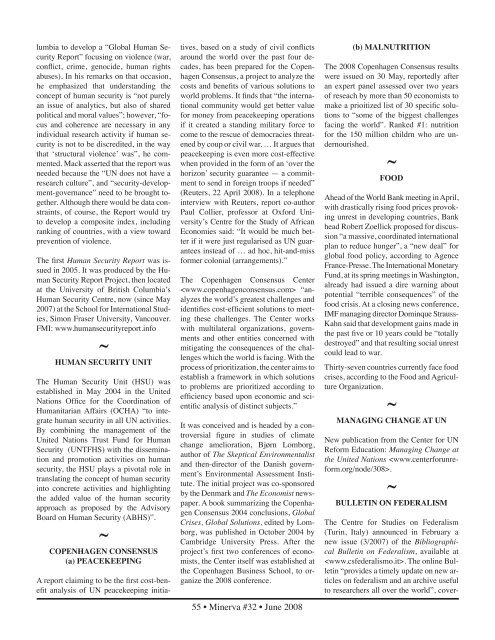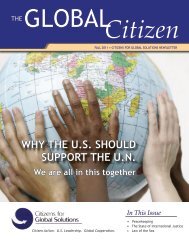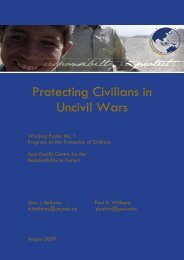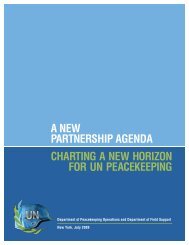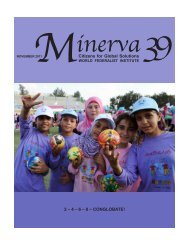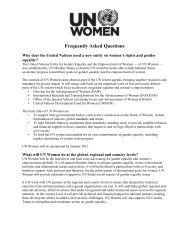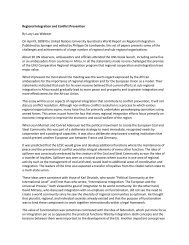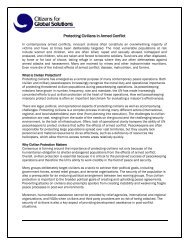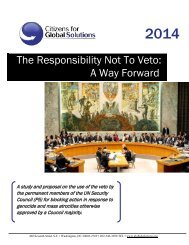Minerva, Spring 2008 (Volume 32) - Citizens for Global Solutions
Minerva, Spring 2008 (Volume 32) - Citizens for Global Solutions
Minerva, Spring 2008 (Volume 32) - Citizens for Global Solutions
You also want an ePaper? Increase the reach of your titles
YUMPU automatically turns print PDFs into web optimized ePapers that Google loves.
lumbia to develop a “<strong>Global</strong> Human Security<br />
Report” focusing on violence (war,<br />
conflict, crime, genocide, human rights<br />
abuses). In his remarks on that occasion,<br />
he emphasized that understanding the<br />
concept of human security is “not purely<br />
an issue of analytics, but also of shared<br />
political and moral values”; however, “focus<br />
and coherence are necessary in any<br />
individual research activity if human security<br />
is not to be discredited, in the way<br />
that ‘structural violence’ was”, he commented.<br />
Mack asserted that the report was<br />
needed because the “UN does not have a<br />
research culture”, and “security-development-governance”<br />
need to be brought together.<br />
Although there would be data constraints,<br />
of course, the Report would try<br />
to develop a composite index, including<br />
ranking of countries, with a view toward<br />
prevention of violence.<br />
The first Human Security Report was issued<br />
in 2005. It was produced by the Human<br />
Security Report Project, then located<br />
at the University of British Columbia’s<br />
Human Security Centre, now (since May<br />
2007) at the School <strong>for</strong> International Studies,<br />
Simon Fraser University, Vancouver.<br />
FMI: www.humansecurityreport.info<br />
~<br />
HUMAN SECURITY UNIT<br />
The Human Security Unit (HSU) was<br />
established in May 2004 in the United<br />
Nations Office <strong>for</strong> the Coordination of<br />
Humanitarian Affairs (OCHA) “to integrate<br />
human security in all UN activities.<br />
By combining the management of the<br />
United Nations Trust Fund <strong>for</strong> Human<br />
Security (UNTFHS) with the dissemination<br />
and promotion activities on human<br />
security, the HSU plays a pivotal role in<br />
translating the concept of human security<br />
into concrete activities and highlighting<br />
the added value of the human security<br />
approach as proposed by the Advisory<br />
Board on Human Security (ABHS)”.<br />
~<br />
COPENHAGEN CONSENSUS<br />
(a) PEACEKEEPING<br />
A report claiming to be the first cost-benefit<br />
analysis of UN peacekeeping initiatives,<br />
based on a study of civil conflicts<br />
around the world over the past four decades,<br />
has been prepared <strong>for</strong> the Copenhagen<br />
Consensus, a project to analyze the<br />
costs and benefits of various solutions to<br />
world problems. It finds that “the international<br />
community would get better value<br />
<strong>for</strong> money from peacekeeping operations<br />
if it created a standing military <strong>for</strong>ce to<br />
come to the rescue of democracies threatened<br />
by coup or civil war. … It argues that<br />
peacekeeping is even more cost-effective<br />
when provided in the <strong>for</strong>m of an ‘over the<br />
horizon’ security guarantee — a commitment<br />
to send in <strong>for</strong>eign troops if needed”<br />
(Reuters, 22 April <strong>2008</strong>). In a telephone<br />
interview with Reuters, report co-author<br />
Paul Collier, professor at Ox<strong>for</strong>d University’s<br />
Centre <strong>for</strong> the Study of African<br />
Economies said: “It would be much better<br />
if it were just regularised as UN guarantees<br />
instead of … ad hoc, hit-and-miss<br />
<strong>for</strong>mer colonial (arrangements).”<br />
The Copenhagen Consensus Center<br />
“analyzes<br />
the world’s greatest challenges and<br />
identifies cost-efficient solutions to meeting<br />
these challenges. The Center works<br />
with multilateral organizations, governments<br />
and other entities concerned with<br />
mitigating the consequences of the challenges<br />
which the world is facing. With the<br />
process of prioritization, the center aims to<br />
establish a framework in which solutions<br />
to problems are prioritized according to<br />
efficiency based upon economic and scientific<br />
analysis of distinct subjects.”<br />
It was conceived and is headed by a controversial<br />
figure in studies of climate<br />
change amelioration, Bjørn Lomborg,<br />
author of The Skeptical Environmentalist<br />
and then-director of the Danish government’s<br />
Environmental Assessment Institute.<br />
The initial project was co-sponsored<br />
by the Denmark and The Economist newspaper.<br />
A book summarizing the Copenhagen<br />
Consensus 2004 conclusions, <strong>Global</strong><br />
Crises, <strong>Global</strong> <strong>Solutions</strong>, edited by Lomborg,<br />
was published in October 2004 by<br />
Cambridge University Press. After the<br />
project’s first two conferences of economists,<br />
the Center itself was established at<br />
the Copenhagen Business School, to organize<br />
the <strong>2008</strong> conference.<br />
55 • <strong>Minerva</strong> #<strong>32</strong> • June <strong>2008</strong><br />
(b) MALNUTRITION<br />
The <strong>2008</strong> Copenhagen Consensus results<br />
were issued on 30 May, reportedly after<br />
an expert panel assessed over two years<br />
of reseach by more than 50 economists to<br />
make a prioitized list of 30 specific solutions<br />
to “some of the biggest challenges<br />
facing the world”. Ranked #1: nutrition<br />
<strong>for</strong> the 150 million childrn who are undernourished.<br />
~<br />
FOOD<br />
Ahead of the World Bank meeting in April,<br />
with drastically rising food prices provoking<br />
unrest in developing countries, Bank<br />
head Robert Zoellick proposed <strong>for</strong> discussion<br />
“a massive, coordinated international<br />
plan to reduce hunger”, a “new deal” <strong>for</strong><br />
global food policy, according to Agence<br />
France-Presse. The International Monetary<br />
Fund, at its spring meetings in Washington,<br />
already had issued a dire warning about<br />
potential “terrible consequences” of the<br />
food crisis. At a closing news conference,<br />
IMF managing director Dominque Strauss-<br />
Kahn said that development gains made in<br />
the past five or 10 years could be “totally<br />
destroyed” and that resulting social unrest<br />
could lead to war.<br />
Thirty-seven countries currently face food<br />
crises, according to the Food and Agriculture<br />
Organization.<br />
~<br />
MANAGING CHANGE AT UN<br />
New publication from the Center <strong>for</strong> UN<br />
Re<strong>for</strong>m Education: Managing Change at<br />
the United Nations .<br />
~<br />
BULLETIN ON FEDERALISM<br />
The Centre <strong>for</strong> Studies on Federalism<br />
(Turin, Italy) announced in February a<br />
new issue (3/2007) of the Bibliographical<br />
Bulletin on Federalism, available at<br />
. The online Bulletin<br />
“provides a timely update on new articles<br />
on federalism and an archive useful<br />
to researchers all over the world”, cover-


